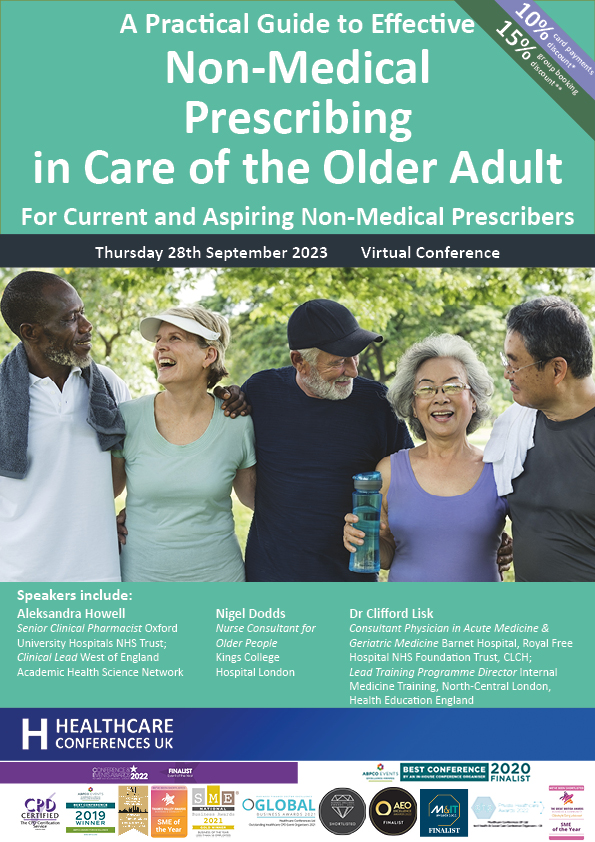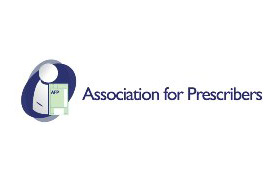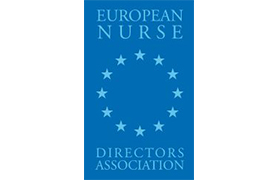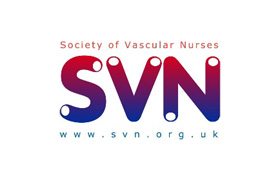Follow the conference on Twitter #NMPolder
Find out more about virtual attendance
This important national conference provides an essential update for current and aspiring non medical and pharmacist prescribers on prescribing for older adults. Through national updates and extended interactive practical case studies delegates will hear how to develop and maintain prescribing competence, and how to develop effectiveness in post qualification practice. The conference will discuss the role of the September 2021 Updated Prescribing Competency Framework in supporting non-medical prescribing in older adults. The conference will include case studies on managing pain in the older person, improving medicines optimisation, prescribing in falls prevention, frail older people, and delirium, and developing the role of the NMP in care homes. The conference will include an extended focus on ensuring patient safety and the Nurse Prescribers role with regard to medication management, polypharmacy and de-prescribing following the 2021 GIRFT recommendations.
Many patients treated within geriatric medicine are on multiple medications (polypharmacy), often due to common multi-morbidities such as diabetes, dementia, osteoporosis, heart failure and COPD… on average, 17% of patients over 75 in England are on ten or more prescribed medicines and up to 30% in some CCG areas… Older people with frailty may suffer from altered drug pharmacokinetics and loss of homeostatic reserve, which increases the risk of side effects such as falls and delirium. Certain medicines, such as anticoagulants, analgesics and drugs for diabetes, are particularly prone to cause serious side effects, Rates of medication error are higher in older adults, in care home settings, primary and secondary care and during transfer of care. This appears to be compounded when there is evidence of co-morbidity, such as dysphagia, kidney disease or dementia. These side-effects and errors contribute to high rates of hospital admission among people over 75, especially those with frailty. Medicines safety in care of older people For all of these reasons, it is vital that the use of medicines in care of older people is closely monitored and reviewed to improve outcomes for patients, avoid unnecessary admissions and reduce the overall cost of care.”
“Rates of medication error are higher in older adults, in care home settings, primary and secondary care and during transfer of care, contributing to high rates of hospital admission among people over 75, especially those with frailty… patient safety is paramount when addressing older adults prescribing”
“Around 1 in 5 prescriptions for older people living at home may be inappropriate , with older people who are already on multiple medications being most at risk… too many older people are being let down by a healthcare system that is allowing medicines to do more harm than good… It is vital we tackle the very real problem of older people taking too many medicines. However, we must also guard against the risk of undertreating older people… Good clinical management is the key – ensuring that every older person is treated as an individual with their care optimised to best meet their need”
This conference will enable you to:
- Network with colleagues who are working to improving pharmacist and non medical prescribing for older adults
- Learn from outstanding practice in ensuring patient safety in older adult prescribing
- Reflect on Pain management in the older adult and some of its many facets through case presentation
- Improve medicines optimisation
- Understanding how to reduce inappropriate or problematic polypharmacy
- Learn how to use the September 2021 revision of the National Prescribing Competency Framework
- Understand how to effectively develop, demonstrate and maintain continued competence in Prescribing for Older Adults
- Explore best practice in frailty, Polypharmacy & Prescribing
- Reflect on lessons from experts in non medical prescribing for specific case study areas with in depth interactive sessions focusing on pain in the older person, medication management for falls prevention, prescribing to avoid delirium (including as a symptom of Covid-19) and the role of the NMP in care homes
- Working with patients with co-morbidity
- Develop your role and confidence as a non medical prescriber
- Self assess, reflect and expand your skills in prescribing practice whilst understanding your limits of practice
- Supports CPD professional development and acts as revalidation evidence. This course provides 5 Hrs training for CPD subject to peer group approval for revalidation purposes
100% of delegates attending the last conference said it would ultimately have a positive impact on patient experience and outcomes.
100% of delegates attending the last confernece would recommend this to a colleague.







